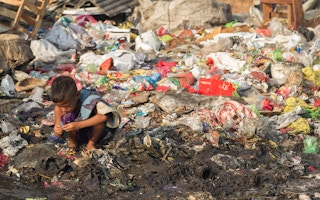A summer trip to Danjugan Island nature reserve in 2015 opened development worker Princess Bala-an’s eyes to the wonders of marine life in the Philippines island region of Negros.
It was around the time when Ellen MacArthur, a retired British sailor and circular economy advocate, warned plastic waste would outweigh fish in the sea by 2050, unless people stopped polluting the ocean.
Bala-an decided to dive deep into the cause by joining the Philippine Reef and Rainforest Conservation Foundation as community manager for a project to reduce plastic waste and raise public awareness of the problem.
There she helped small businesses such as neighbourhood grocery stores and cafes use less plastic and promote a zero-waste economy across Negros Occidental, a central island province prone to flooding, landslides and devastating typhoons.
Her project, called Wala Usik (“nothing wasted”) in the local language, challenged the toxic “sachet culture” that is choking the seas of the Philippines.
Bala-an and her team set up a one-year pilot programme for “sari-sari” grocery stores, whose customers are often low-income Filipinos, to use reusable or refillable containers for common household items and to sell solid versions of liquid products.
“
Behavioural changes take a long time. But it is inspiring to see small, meaningful changes in people through the programme.
Princess Bala-an, community manager, Wala Usik
She also guided restaurant and café owners to source local and compostable materials as alternatives to plastic packaging.
In addition, she taught residents of coastal towns to conduct their own waste audits through clean-ups, to better understand the problem and how it manifests in the ocean.
The 30-year-old is now expanding this work as strategic projects officer for the Negros Women for Tomorrow Foundation, a group that helps women achieve economic independence.
Why did you choose this job?
“I used to work with a humanitarian foundation in the field of disaster risk reduction, providing safety to the most vulnerable (people). It dawned on me that their vulnerabilities are tied to the environment. That made me closer to conservation and gave me the energy to explore the root cause of disasters, find solutions and work with communities as stewards of the environment.”
How did you get the job?
“I was introduced to Danjugan Island by the Philippine Reef and Rainforest Conservation Foundation during a summer marine camp in 2015. There, I learned about the beauty of marine life and how it is connected to what we do on land.
I started joining the camp every year, until the foundation opened a position as community manager of the Wala Usik program in 2018. I applied for the job. I was lucky to be chosen. I started doing the work with communities and learning about solid waste management laws.”
What do you enjoy the most about your job?
“Community development is the best part of my job. It requires patience, presence and time. Despite the challenges in my role as project manager for Wala Usik, I saw how community members - from households to store owners and micro-enterprises - can also be environmental protectors. I am not alone in this job. That connection is what I really like and love in my field of work.
Behavioural changes take a long time. But it is inspiring to see small, meaningful changes in people through the programme. At times, when I go back to a partner village, some would say our workshops and waste audits convinced them to choose better lifestyle options. Local government units who worked with us before passed laws to ban single-use plastics or to improve their solid waste management policies. It’s an entire community that I’m lucky and blessed to be part of.”
What is the biggest challenge you have encountered in your job?
“At the end of 2019, I thought we were reaching our project goals. Then the Covid-19 pandemic happened and posed a great challenge to people in conservation. Wala Usik partner stores had to close due to lack of customers. We needed to go back to square one and do it all over again, and it made us realise that the programme must be sustainable.
This is why I stayed with the programme after the pandemic and decided to work on it with another organisation… I thought, if I didn’t continue (it), no one else would take up the challenge and we would lose grasp of what we have built so far in our communities. Changes take a long time and there should be continuity in terms of conservation efforts.”
How do you see jobs in your sector evolving in the next decade?
“When people say ‘green workers’, they usually think of people like me. But I also want them to think about others in the sector - like waste pickers who are still considered as informal workers, without benefits, hazard pay and assurance of income. I want to see them as formal workers with social and financial stability. We need more opportunities and programmes to capacitate unseen workers in the green sector.
I would also be happy to see other non-governmental organisations, corporations or enterprises committing to hiring more people, especially women, for greener and sustainable programmes. As an NGO worker, I take risks and innovate - just like in Wala Usik. But these projects often have limited funding and short timelines - and we need to think of ways to make them sustainable.”
This story was published with permission from Thomson Reuters Foundation, the charitable arm of Thomson Reuters, that covers humanitarian news, climate change, resilience, women’s rights, trafficking and property rights. Visit https://www.context.news/.










